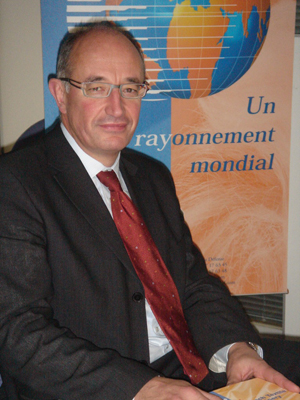
Solvay launches FusePly for aerospace industry
Interview with the President of the French Textile Machinery Manufacturers Association The French Textile Machinery Manufacturers Association (UCMTF) President, Bruno Ameline and the Secretary General, Evelyne Cholet, report on the present state and the perspectives of their member companies. These are 35, mostly SME's but leaders or among the world leaders on niche markets and specific applications. Their total annual turnover is around 1 billion Euros (1.4 billion USD), most

2nd June 2011
Innovation in Textiles
|
Paris

The French Textile Machinery Manufacturers Association (UCMTF) President, Bruno Ameline and the Secretary General, Evelyne Cholet, report on the present state and the perspectives of their member companies. These are 35, mostly SME's but leaders or among the world leaders on niche markets and specific applications. Their total annual turnover is around 1 billion Euros (1.4 billion USD), most of it is exported.
For our industry, the economic crisis is clearly over. There has been a significant turn-around since early or late 2010, the timing and importance depending on geographical and application sectors.
Weaving has recovered as soon as early 2010 in China (which remains the dominant market), India, Pakistan, and Turkey. For the longer term, the need for textile quality is sustaining Chinese investments in European equipments; and I am happy to report that it really seems that Chinese customers now think more in terms of investment profitability (taking into account the quality and the productivity of their equipment) and less in terms of sheer investment costs.
Nonwoven has performed fairly well in 2010. In Turkey, this sector has been particularly active. The recovery accelerated in the second half of 2010 and has continued to progressively and regularly increase since then. The market is currently particularly strong for needlepunch applications. In China, the demand has doubled since 2008.
Filaments technologies climbed high in early 2010 then have levelled to a more stable level, both in industrial and apparel applications. Here again, China is particularly active.
For yarn finishing, the USA and Turkey have significantly pulled the business since early 2010, without forgetting the Middle-East markets, and more lately Europe. 2011 seems to present a good activity profile.
All together, the French textile machinery industry has enjoyed since mid-2010 an increasingly positive trend and is back to activity levels in the range of pre-crisis levels.
It is not foreseen that the events in North Africa and the Middle East or the disaster in Japan will significantly affect the market situation, except maybe for sourcing electronic components from Japan. Most of French textile machinery manufacturers have a clear route up to the end of 2011, and some for the early months of 2012. In this context, we anticipate a successful ITMA 2011 but some investors may slow their investment decisions before ITMA awaiting for the innovations to be unveiled in Barcelona.
 Is this extremely good situation short term only or do you foresee a bright future based on a coherent and consistent strategy of your member companies?
Is this extremely good situation short term only or do you foresee a bright future based on a coherent and consistent strategy of your member companies?
Markets fluctuate and our industry is particularly used to that, and therefore we know that the current positive trend is not a guarantee for the post-mid 2012 period. We are aware of and prepared to any possible economic downturn.
In fact, some factors may still adversely affect the fragile economic recovery.
The high public debt levels in many countries may lead governments to monetary and tax policies which could limit the economic growth.
Unprecedented increases in raw material and energy costs may lead to pressure on margins, investments and therefore growth. This factor might be aggravated by the disaster in Japan in two ways: limited access to specific components and materials from Japan (electronics), worldwide impact of the Fukushima nuclear drama on the energy policies and prices worldwide.
Last factor, the near collapse of the international banking system which took place during the financial crisis and the new rules which have been decided, make financing more and more difficult to organize as banks lending policies have tightened up.
These uncertainties, we believe, make even more up-to-date the strategy of most French manufacturers which is to focus on niche or selected markets with unique high-value products and limited competition from Asia. Unique machines will continue to be in demand for our companies, as Chinese and Indian textile equipment manufacturers naturally focus on mass product groups where their low costs are definitely an advantage; pricing should be less of a problem for machines of which the sources are limited. Our members offer unique technologies for specific application markets like filament heat finishing, dobbies for weaving looms, recycling equipment, long staple combing and spinning, to name a few.
Such strategy however calls for three musts which small-to-medium size companies may find challenging to comply with:
This is both our challenge and our opportunity. The French textile machinery manufacturers have clearly selected this strategy and are sticking to it. I trust this is our main competitive strength.
ITMA is a unique place for textile producers to meet their machinery suppliers, know more about the state of the art, discover the latest innovations and look forward to the future.
I believe that ITMA in Barcelona will be a good edition, thanks to the positive investment trend, the attractiveness of the location itself (it will offer a sunny weather in a wonderful city)and all the enlarged offerings that Cematex has introduced: the World Textile Summit which will take place the day before the opening, the Advanced Textile symposium organized by the Industrial Fabric Association International, the first time presence of the Textile Universities and Research Centres, the opening of the fair to new sectors like fibres.
There will be many interesting events during ITMA, which will be a unique opportunity for networking on innovations.
For the long term ITMAs in Europe have to meet several challenges. Clearly focus on innovations and be identified by customers as such is one. It then has also to continue to attract visitors from Asia, in particular China, India, Turkey and consolidate its image as a unique worldwide meeting point of the whole textile industry, to which ITMA Asia is a useful complement.
A very attractive location, Barcelona will be a remarkable gathering remembrance for all visitors and may open up the path for new show locations beyond the traditional Munich/Hannover, Milan, and Paris.
UCMTF will continue to provide logistical support to our member companies to help them exhibit at the main shows and organize seminars in counties where the markets are most promising. In the next few years we will mostly focus on the BRICs. In the third quarter of 2011, after ITMA we will organize a seminar in Brazil. We have already organized two seminars last year in India but we must accelerate our effort on this promising market, to open new markets in China, and Russia is a clear must also. Some other countries are of particular importance, I think particularly about Turkey even if we have been there last year.
In all these countries, we have to work very closely with our customers, we have to be local partners and meet them not only in the capitals of the countries but in the various local textile clusters.
Without constant innovations there is no future, I already said that but without protecting our innovations we cannot take advantage of them. UCMTF helps our members protect their innovations. For example, on ITMAs, Cematex has already organized a crisis bureau but if our members have not prepared themselves to use it in a very short time, it cannot be effective. UCMTF works on how to use this tool and make it readily available to our members.
As an Association, we must participate in the fight for sustainable development and particularly for saving energy in the production processes. It is certainly the responsibility of our members to fine tune the individual machines and optimize the energy consumption of a whole production line. They have already got fascinating results as in many real world examples, the energy savings already achieved are in the 30-40% range but every year they must get better results and reduce the energy consumption per unit of textile output. Our task is to make these researches and results known. We have done it in a symposium and we have given a comprehensive report to the press. We will continue.
I am particularly happy to report that, just recently, our Secretary General, Mrs Evelyne Cholet has been promoted International Relations Director of the French Federation of Mechanical Engineering Industries (FIM).
FIM which groups market sector Associations like ours, is an organization with a powerful influence in French and European economic policies. Thanks to her day to day involvement for our members and her know how of the French organisations which support the French exports worldwide, Evelyne Cholet will be a tremendous asset for FIM, in return her new role will certainly be of particular benefit to our members.
Many problems need to be solved. Today, I think particularly about the need to find solutions to finance our exports.
May I recommend our website www.ucmtf.com to all interested parties; we welcome you on this website but even more on our booths at next ITMA in Barcelona.

Business intelligence for the fibre, textiles and apparel industries: technologies, innovations, markets, investments, trade policy, sourcing, strategy...
Find out more